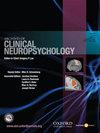A - 26 运动震荡专科医生确定震荡恢复的临床标准调查
IF 2.1
4区 心理学
Q2 PSYCHOLOGY
引用次数: 0
摘要
确定运动脑震荡专家在判断运动脑震荡康复情况时所使用的标准。我们假设神经心理学家、内科医生和注册运动训练师(ATC)在使用决策标准方面存在差异。 143 名运动脑震荡专家(神经心理学家 45 人、内科医生 41 人、注册运动训练师 (ATC) 57 人)完成了一项调查,对确定青少年和成年运动员脑震荡康复的特定标准的重要性进行了评分。专家组之间的差异通过 Kruskal-Wallis 检验进行了检验。 在 "神经认知测试分数的使用"、"平衡测试"、"体格检查"、"神经认知测试无症状激发"、"运动员对恢复运动的焦虑报告 "和 "家庭成员对恢复的报告 "方面,不同专家小组对青少年和成人的标准评分存在明显差异,所有 P 均小于 0.001。对于青少年和成人,医生认为 "使用神经认知测试评分 "和 "神经认知测试无症状刺激 "的重要性低于其他提供者,而 "医生检查 "的重要性高于其他提供者。神经心理学家认为 "平衡测试 "和 "运动员对重返运动场的焦虑报告 "的重要性低于其他医疗服务提供者;而 ATC 认为 "家庭成员对康复的报告 "的重要性低于其他医疗服务提供者。 我们的研究结果增进了人们对确定运动脑震荡康复情况的多学科护理标准的了解,并表明在制定所有运动脑震荡医疗服务提供者通用的临床标准时进行合作的重要性。本文章由计算机程序翻译,如有差异,请以英文原文为准。
A - 26 A Survey of Sports Concussion Specialists’Clinical Criteria to Determine Concussion Recovery
To identify criteria used by sports concussion specialists in determining recovery from sport-related concussion. We hypothesized differences in use of decision-making criteria among neuropsychologists, physicians, and certified athletic trainers (ATCs).
143 sports concussion specialists (neuropsychologists = 45, physicians = 41, and certified athletic trainers (ATCs) = 57) completed a survey rating the importance of specific criteria for determining concussion recovery in youth and adult athletes. Differences between specialist groups were examined with Kruskal-Wallis tests.
There were significant differences in criteria ratings across specialist groups regarding youth and adults for “use of neurocognitive test scores,”“balance testing,”“physical examination,”“no symptom provocation with neurocognitive testing,”“athlete report of anxiety about return to sport,“and “family member’s report of recovery,“all p’s < 0.001. For youth and adults, physicians ranked “use of neurocognitive test scores”and “no symptom provocation with neurocognitive testing”as less important than other providers, while “physician examination”was ranked as more important. Neuropsychologists ranked “balance testing”and “athlete report of anxiety about return to sport”as less important than other providers; and ATCs ranked “family member’s report of recovery”as less important than other providers.
Our results advance understanding of multidisciplinary standards of care in determining recovery from sports concussion and suggest the importance of collaboration in establishing clinical criteria common to all sports concussion health care providers.
求助全文
通过发布文献求助,成功后即可免费获取论文全文。
去求助
来源期刊
CiteScore
4.60
自引率
7.70%
发文量
358
审稿时长
6-12 weeks
期刊介绍:
The journal publishes original contributions dealing with psychological aspects of the etiology, diagnosis, and treatment of disorders arising out of dysfunction of the central nervous system. Archives of Clinical Neuropsychology will also consider manuscripts involving the established principles of the profession of neuropsychology: (a) delivery and evaluation of services, (b) ethical and legal issues, and (c) approaches to education and training. Preference will be given to empirical reports and key reviews. Brief research reports, case studies, and commentaries on published articles (not exceeding two printed pages) will also be considered. At the discretion of the editor, rebuttals to commentaries may be invited. Occasional papers of a theoretical nature will be considered.

 求助内容:
求助内容: 应助结果提醒方式:
应助结果提醒方式:


